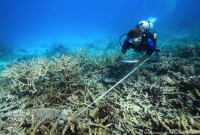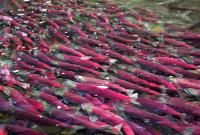Support strong Canadian climate journalism for 2025

Making its debut April 14 and 15 in Vancouver, the festival explores the theme of the elements, --land, air, fire and water. With feature-length presentations, short films, animation, and films by youth, the scenes and soundtracks transport viewers from the deep sea, across the land, into the fire and sky.
The cinematography depicts the lives of creatures ranging from the minute to massive. The wide variety of films explores the convergence of science and nature, environment and wildlife, art, heritage, and cultures from around the world. “Science World is the only place to see many of these films,” says festival Chair, Duane Sharman.
A festival for all ages, there is something for everyone. Spectacular cinematography will carry you along, swimming with the fish, and running with wolverine. The stories span the globe, from India, to Madagascar, Australia, Belgium, Russia, Vietnam, BC and beyond.
The two-day event includes a roster of more than 40 films, including family-friendly films in the daytime along with a featured entertainer and a discussion panel, while evenings are adult-oriented events, highlighted with a launch party and keynote speaker.
Sharman hopes that Elements will do more than entertain. “I want to unify people with common understanding of what’s happening in the world, from a scientific point of view.“
Sharman is also a filmmaker and composer for movies and is proud of the fact that many of the independent films, are making a debut at this festival. Some, like Sharman’s film, The End Game, and the headliner, Chasing Coral, have already won a number of international awards. "You have to see Chasing Coral on the big screen," enthuses Sharman.
In celebration of the International Year of the Reef, there is a focus on the coral reef with of three reef films, including The End Game, which was a catalyst for the whole festival.
Sharman is new to staging festivals but adapts easily to fresh challenges. After retiring from a career as an engineer and entrepreneur in the high tech world, he shifted his focus from technology to musical technique, writing scores for film, and pursuing his passion for scuba diving.
It was diving that led Sharman to coral reefs, and the coral bleaching that led him to making his film, which then led to him pulling together this festival in just a matter of months.
Not one to waste time, Sharman is a dynamo with infectious enthusiasm for the films and speakers he is presenting, including the illustrious coral expert, Dr. Ruth Gates, the host speaker on Saturday night.

Sharman first saw coral bleaching in Hawaii, in 2014. By that time, there had been two global bleaching events, in '98, when 16 percent of the reefs around the world died, and 2010. Hawaii had been spared because of cold water upwelling. "I did know a little of the history so I knew this was a serious issue. When the bleaching returned in 2015, that was the first time that bleaching had hit any location in the world on two consecutive years, a fact that I learned when I met Dr. Gates." The bleaching continued across the Pacific and Indian Oceans, and into the Caribbean during 2016.
At first, “people weren’t sure what was happening,” or how widespread the bleaching was occurring. After the back-to-back bleaching events, Sharman says, "in one bay where I dove, 70 percent of the coral had turned white.” By this time, the cause for the bleaching was clear. Global warming was raising ocean temperatures.
Sharman, until this point, would dive and make YouTube videos about the reef for his friends back home. Now he knew that the gravity of the situation required a film that could carry the weight of the message. This film would be different. “There’s about a billion people around the world that rely on reef fish as their primary protein. Once the reef ecology breaks down, the fish have nowhere to hide.”
After years of leading edge thinking and problem-solving in the tech world, Sharman knew he was in over his head with this problem. He went looking for answers and managed to track down Dr. Ruth Gates, a highly respected molecular biologist and coral researcher, at her lab in Hawaii. “It’s like a Jurassic Park there,” he says with a laugh, referring to the exotic island with its lab for gene sequencing. Dr. Gates, with whom he felt an immediate connection, would become the narrator for his film. Her experiments with “assisted evolution,” a process she explains in The End Game, have a possibility, she thinks, to protect the coral.
Sharman describes going with his film team to the Great Barrier Reef after the last bleaching episode. He says the locals told divers to head toward an underwater wall to be certain of finding healthy coral. In reality, says Sharman, “there wasn’t a living thing there; it was a massive area devoid of life.” He explains, “This wasn’t like a Crown-of-thorns invasion. It wasn’t short term and local. It started in March and by May over 90 percent of the upper swath of the reef was dead.” He pauses in recollection. “It was very emotional. We came out fighting back tears.”

Sharman wanted people to see what he saw, and to grasp the gravity of it all. “When I went and saw Ruth on Coconut Island, I learned more about coral in those three hours than I’d learned over a lifetime.” Wanting to share that knowledge, he created, The End Game, a powerful film shot by Nik Green. It draws the viewer in with an upbeat soundtrack, the passion of the narrator, and the intriguing possibilities for saving reefs around the world.
In the film, Gates discusses her leading-edge research into forcing species to adapt to environmental stresses like global warming through assisted evolution. “Have we ever approached our science that way?” she asks rhetorically. “No. But can we? Yes.”
Dr. Gates has utter conviction in her belief that “the risk of doing nothing is the risk of losing every reef on the planet.” She concludes, “We need an end game to help Mother Nature.” It’s this kind of commitment to solutions that Sharman says audiences so desperately want to see right now. "Audiences want good news."
Sharman, in addition to his filmmaking and film orchestration, has several patents in wireless technology. “But that’s past life,” he says modestly, changing the subject back to film festivals. His focus is on solving problems in the world with human connection, shared information, and education. Films with a science base, he believes can be part of the solution.
“I don’t know if we will solve any problems with this festival,” says Sharman, “but we can provide a forum where people will go away more informed. I hope that’s worthwhile.”
A film competition for high school students is part of the festival, following on two filmmaking sessions last month. “The student films are all a personal expression. I wanted to give them a place to be heard,” says the director, “and they get to see their work on the screen, with an audience. And,” he adds, with emphasis, “they do have something to say.“
The collection of films is diverse and rich in context, with social, environmental, and scientific reference in each.

Here’s a description of just a few:
- I am Salmon is a short film that weaves first nations perspectives and stories with beautiful cinematography.
- The Peel Project presents urban artists and their desire to connect with Canada’s wild and harsh northern landscape as they canoe the Yukon’s threatened Peel River.
- A Herd of Orphans is a Canadian Premiere that tracks the heart-warming efforts of workers at an African elephant orphanage who help elephants learn to be part of a herd living in the wild.
- Confluir is a Vancouver Premier that takes the audience to Peru and the Marañón River, where an international team of scientists rafts the river to study the effects of proposed dams.
- Wolverine: Ghost of the Northern Forest was five years in the making. “The filmmaker takes you tromping around in Alberta in the middle of winter in search of wolverine. -- A real labour of love,” says Sharman.

- Acid Horizon coaxes you to go along with scientists who delve into the ocean’s abyss, a frontier where the potential for a catastrophic outcome becomes almost visceral. The researchers must work determinedly against elements, mechanical challenges and he constraints of funding and time in order to bring back a fragment of hope for the future of coral in an increasingly acidic ocean.
- The animated short LOOK! is cute and quirky and demands your attention.
The festival, an intersection of science, art, and entertainment is a refreshing addition to Vancouver’s cultural scene. With its rich flow of images along with engaging discussions and insights from the filmmakers, the first annual event brings with it a gust of fresh air and hope.
The daytime program is free with admission to Science World, and curated for all ages.
For an unusual and interesting movie night, consider attending the evening programs for adults over the age of 19. The Elements Festival Launch Party on Saturday night, will feature Chasing Coral, along with a special panel hosted by Dr. Ruth Gates on “ocean threats.” The party will include complementary refreshments from Granville Island Brewery, and appetizers from Vij's Restaurant. Check out the Elements Film Festival website for full details and schedule: https://www.elementsfilmfest.org/tickets






Comments